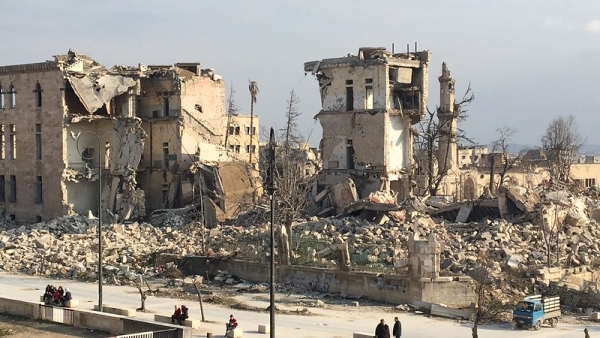Introduction
The report analyzed was created by Human Rights Watch, an international non-governmental organization (NGO) that conducts research on human rights’ violations worldwide. It is known for its rigorous fact-finding, impartial reporting, and targeted advocacy. The aim of the report is to inform the public about human rights abuses in Turkish-occupied northern Syria and to influence policymakers, promote justice, and protect the rights of vulnerable populations globally.
Methodology
The report was based on interviews conducted between November 2022 and September 2023. A total of 58 individuals (presented anonymously), who had direct experience with these violations or witnessed them, were interviewed, alongside journalists, representatives of NGOs and activists. The locations of the interviews included Turkish-occupied Afrin and Ras al-Ain, as well as Kurdish-governed areas in northern Syria, the Kurdistan Region of Iraq, Europe, Lebanon, and Turkey. Interviews were conducted in Arabic and Kurdish, both in person and via secure messaging applications. Moreover, images and documents were reviewed to corroborate the findings.
Current Situation
Since 2016, Turkey has occupied northern Syria, including regions like Aleppo and Afrin, through three military operations aimed at weakening the Kurdish presence along the border.
Turkey played a central role in the formation of the Syrian National Army (SNA) from opposition groups, mostly ex-Free Syrian Army fighters. Turkey asserts that these occupied territories are "safe zones'' that are used for border security and the facilitation of the return of Syrian refugees from Turkey. However, the reality is different: human rights violations are perpetrated by the SNA, Military Police, Turkish Armed Forces, and intelligence agencies, with Turkey providing extensive support to local authorities.
Despite the SNA presumably reporting to the Syrian Interim Government's Ministry of Defense, it is evident that they operate under Turkish military and intelligence directives. The report indicates that abuses, particularly against Kurdish civilians, occur with Turkish knowledge. Furthermore, in the so-called safe zones arbitrary resettlements and expulsions are performed. In January 2024, two human rights organizations filed a criminal complaint in Germany to investigate alleged violations of international law by SNA factions in Afrin. The complaint was filed under the principle of universal jurisdiction, which allows national courts to prosecute serious international crimes regardless of where they were committed.
Abuses committed
Abuses include the abduction and detention of individuals with the goal of extorting money from those perceived to be wealthy. In the 23 documented cases, the amount paid ranged from $100 to $30,000.
With regard to arbitrary and incommunicado detention, it is notable that in the various factions or in the Military Police detention centers across Afrin and Ras al-Ain, such detentions often last from three weeks to over two years. During this period, detainees are denied visits and subjected to torture in order to coerce confessions, which frequently relate to the detainees' alleged involvement with Kurdish armed groups.
The methods of torture employed include beating, pulling out teeth and nails, and burning, in addition to psychological abuse, such as solitary confinement and death threats. In some instances, the aforementioned forms of torture have resulted in the death of the detainees, as evidenced by the case of Kurdish lawyer Luqman Hannan. Furthermore, female detainees are subjected to a range of sexual violence, including verbal, physical, and psychological abuse, which the UN Commission of Inquiry on Syria has defined as a weapon of war. This includes being asked sexual questions during interrogations and being touched inappropriately. The conditions for all detainees are inhumane, with the cells being either tiny and insect-infested or overcrowded and lacking proper bedding.
In February 2018, the Syrian Interim Government’s Ministry of Defense established a military justice system with the objective of investigating violations committed by the SNA. However, the system is not sufficiently independent from Turkish authorities, which has resulted in trials that are biased. The UN Commission of Inquiry’s March 2023 report indicated that detainees are subjected to military trials without legal counsel.
Moreover, the SNA and Military Police frequently violate the rights of individuals to housing, land, and property. This includes the seizure of homes, lands, and businesses, often without compensation or restitution. Many of the victims are Kurds. This situation evinces Turkey’s complicity in the disregard of international law on property rights and the fair treatment of residents in occupied areas.
Lack of Accountability
The report indicates a lack of accountability for violations committed by the SNA and Military Police, as detailed by the UN Commission of Inquiry. The Commission observed that there was a lack of information regarding the fairness of the trials and proceedings. Turkey, as the occupying power, has failed to investigate or hold its officials accountable, thereby violating not only international law but also international humanitarian law, including the four Geneva Conventions, the European Convention on Human Rights (ECHR), and the United Nations Convention Against Torture (CAT).
International Recommendations
The report includes a few recommendations. It is recommended that the Turkish government cease its human rights violations and start to investigate the accusations of war crimes perpetrated by its forces and affiliated militias. Furthermore, accountability and reparations should be provided to the victims. Moreover, the Syrian Interim Government and Syrian National Army ought to eliminate unofficial detention centers, release arbitrarily detained individuals, and ensure fair trials. Additionally, the European Union should issue a clarification that Turkey is not a safe third country for asylum seekers and suspend funding until forced deportations cease. Finally, the UN Member States should prosecute those implicated in serious crimes under universal jurisdiction.
To read more, visit:
- About Us | Human Rights Watch (hrw.org)
- syria0224web.pdf (hrw.org)
- Report of the Independent International Commission of Inquiry on the Syrian Arab Republic (A/HRC/54/58) [EN/AR/RU/ZH] - Syrian Arab Republic | ReliefWeb
- The-Geneva-Conventions-of-12-August-1949-and-Protocols-for-printing.pdf (icrcndresourcecentre.org)
- convention_eng (coe.int)
- catcidtp_e.pdf (un.org)







